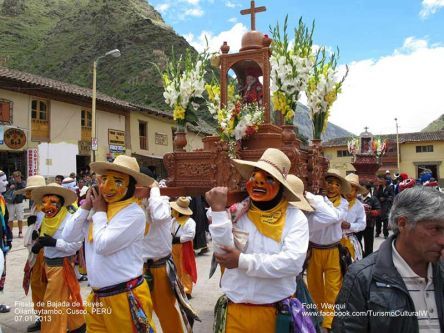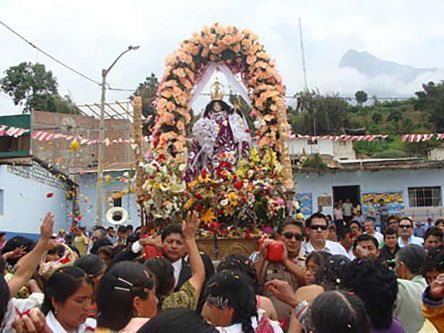While in many first world countries an unaffordable luxury, in Peru having a so-called empleada (domestic worker) that does your cleaning, laundry, cooking, watching the children or even driving you around is quite common and for middle and upper-class Peruvians and foreigners still affordable.
So, if you don’t have time for domestic chores or are more then happy to leave them to someone else, knowing the Peruvian regulations and common practice of employing a domestic worker is essential to avoid disappointments on both sides, problems in general, being taken advantage of / (unknowingly) taking advantage of or even legal disputes.
According to the Peruvian law for domestic workers "Peruvian Domestic Workers Law #31047" there are two types of domestic workers:
- Cama adentro: the domestic worker lives in your house; additional to the wage and other benefits mentioned below, you are obligated to provide a proper quarter and meals and to support further education efforts.
- Cama afuera: the domestic worker doesn’t live in your house and works on agreed hours /days – this can be full time or part-time; it is usually expected that you provide a meal during the working hours – you don’t have to cook for your maid, but either provide the food so he / she can cook herself or pay a few Soles extra for a menu.
Contract yes or no - officially registering your domestic worker or not
The Peruvian domestic workers' law doesn’t differentiate between full-time and part-time domestic workers. According to law domestic workers have the right
- that their position is regularized by a contract in writing
- that their position is registered in the Domestic Workers Registry of the Peruvian Ministry of Labor and with SUNAT
- that they are registered for social security (health insurance EsSalud, pension)
- that they receive certain benefits (learn more below).
Nevertheless, only an estimated 10% of domestic workers are officially registered. It makes absolute sense to have a contract even for part-time maids, which clearly states the rights and obligations of both parties and it’s only right to officially register full-time domestic workers and pay any incidental dues. However, be prepared that some maids don’t see the necessity and don’t want to be officially employed. Domestic workers that only work a few hours per week in a household are rarely registered in Peru.
No matter if officially registered or not, paying certain bonuses in accordance to the labor law even to part-time not officially registered domestic workers is expected.
If you agree to not register your maid and therefore not pay for health insurance, make sure he or she is covered, for example, through a family member. Otherwise, if she has an accident at your house while working, you will be held responsible and end up paying for the treatment.
Wages of domestic workers in Peru
Since January 2025, the minimum wage in Peru is S/ 1130 (around US$ 300) per month for a full-time employment. Full time in Peru means working 8 hours per day, 6 days a week, so 48 hours per week. However, the salary of domestic workers is not bound to the minimum wage but established by mutual agreement of involved parties; so, it could be less and unfortunately often is.
Anyway, it goes without saying to pay a fair wage; but what is fair? While wanting to value the hard work with a generous salary is understandable, you should consider the local situation and don’t overpay or let yourself being taken advantage of.
Additionally, wages for domestic workers in Peru vary heavily between Lima and other cities, but as well in Lima from district to district. So, in La Molina, San Isidro, Miraflores and Surco, you will have to pay more for your helper than, for example, in Jesus Maria, Breña, or Ate. Furthermore, the salary depends on the qualification and experience, but as well on the size of your home and duties.
To give you a general idea (!) about salaries of domestic workers in Lima, here some average (!) numbers for full-time employment:
For someone cleaning and doing laundry, a monthly payment of about S/ 1600 is common. If the duties additionally include cooking and / or watching the children, this number can rise to around S/ 1800. A nanny without other household duties can set you back as well around S/ 1800; a cook which prepares three meals per day on an international level about S/ 1800 - S/ 2000.
Wages in Peru are paid twice per month, on the 1st and 15th. Payments can be made in cash (getting a receipt is highly recommended) or by bank transfer.
Part-time domestic workers that only work for you a few hours per week are usually paid at the end of the day or once per week. Expect to pay more or less S/ 12 - S/ 14 per hour. A usual payment in Lima for a part-time domestic worker for an 8-hour day is between S/ 90 and S/ 110; for working 4 or 5 hours around S/ 60 - S/ 70. Be prepared to provide lunch and to pay for transportation (S/ 3 - S/ 5); best agree about it before your empleada starts working for you.
Don’t be surprised if your empleada insists on wearing a uniform or at least an apron that you have to pay for.
Rest time, vacations and working on public holidays for domestic workers in Peru
Full-time domestic workers have to be at least 18 years of age and should only work 8 hours per day and not more than 48 hours per week. They have the right to 24 hours uninterrupted rest per week.
After one year of working, a full-time domestic worker has the right to 30 days of paid vacation. If the employment is terminated before the first year is up, the domestic worker is entitled to a compensation proportionate to the length of time they were employed by you. So, for each month worked 2.5 days’ worth of the salary.
When a domestic worker only works a few hours at a household, this usually isn’t applied, however if he or she works, for example, every Monday, Wednesday and Friday paid vacation days in proportion to the days worked might be expected. So, best clarify this topic to avoid disagreements.
If a domestic worker agrees to work on a public holiday, he or she is entitled either the usual daily wage plus 50% of the daily remuneration or to a free other working day plus half the daily salary as compensation.
Bonuses and benefits of domestic workers in Peru
"Gratificación" - Bonus pay in July and December
According to Peruvian law, domestic workers are entitled to receive a so-called “gratificación” for the Peruvian Independence Day and Christmas. This bonus equals 50% of the monthly wage and has to be paid each year in the first half of July and in the first half of December. If the employee hasn’t worked a full half year, the gratificación has to be paid proportionate to the length of time they were employed by you.
Not only officially registered domestic workers are entitled to this bonus pay but also unregistered full-time and part-time employees, even those only working a few hours per week for you, see themselves entitled based on the labor law for domestic workers (and the Ministry of Labor agrees). So best calculate how much your empleada earns on average in a month and pay at least 50% as a bonus.
CTS - Severance pay
Domestic employees are additionally entitled to the so-called CTS (Compensación por Tiempo de Servicio, Compensation for Time of Service) which can be compared to a severance pay or unemployment benefit financed by the employer.
The CTS as well equals half a monthly salary per year worked. If the employee hasn’t worked a full year, the CTS has to be paid proportionate to the length of time they were employed by you. The amount can be paid either at the end of each year or held back and then paid in full when the employment is terminated. Be aware that then the CTS has to be paid within 48 hours of the termination and is calculated using the last salary level.
While paying CTS is obligatory for all registered domestic workers, unregistered household helpers, especially those only working a few hours per week for you might not expect it. So best clarify this topic before your empleada starts working for you to avoid disagreements.
EsSalud - Health insurance and ONP / AFP - Public / private pension
Furthermore, officially employed domestic workers are entitled to be medically insured through the Peruvian social security system (EsSalud). The amount, which equals 9% of a monthly salary, has to be paid by the employer.
And last but not least for officially employed domestic workers, the employer has to pay 13% of a monthly salary for retirement benefits. The contribution can either be made to the public pension system called SNP (Sistema Nacional de Pensiones) or to a private scheme known as AFP, which numerous insurance companies offer. Best ask your empleada which system she prefers.
Be aware that payments to the social security system and pension system are only obligatory for officially employed and registered domestic workers. Registration must be made not later than 30 days after employment.
Unregistered empleadas won't be part of the Peruvian social security system. It is not unheard of however that a few domestic workers in Peru refuse to get registered probably arguing that they are already insured through a family member, but ask for the amount the employer would have to pay for health insurance and pension in addition to agreed salary. If you want to go there, is up to you.
Termination of the employment relationship
Both, the employer and employee, can terminate the employment relationship with a 15 days’ notice. If the employee resigns, the employer can release the employee from work immediately if agreed upon. However, if the employer terminates the relationship, he must either employ the domestic worker for another 2 weeks or can terminate immediately by paying an amount equal to 15 days’ worth of salary.
Don’t be surprised that even if you as employer terminate the relationship due to a serious misconduct, you are expected to pay the 15 days’ notice to be able to fire your empleada immediately and above-mentioned bonuses and benefits.
How to register a domestic worker and pay social security contributions
If you agreed to officially employ your domestic worker, put a contract in place detailing the rights and obligations of both parties.
Then register your empleada at SUNAT. This can be done in person at any SUNAT office in Peru. You will need your passport with a valid visa or your Carné de Extranjería (original and copy), a power, water or phone bill showing your address, your domestic worker’s DNI (Peruvian ID, original and copy) and in case they aren’t already inscribed in the social security system, the DNI of your domestic worker’s children and spouse (original + copy). Usually the SUNAT staff is very friendly and helpful and will guide you through the process and forms that have to be filled in.
For a couple of years now, you as well can register your domestic worker online on the SUNAT webpage. The process to register your empleada with SUNAT and social security online is described in detail in the PDF that you can find in the attachment section at the end of the article. To use this online system you need the so-called Clave SOL which only can be applied for online if you have a Peruvian ID. So, you as a foreigner have to visit the nearest SUNAT office anyway to get the Clave SOL and with not being familiar with the whole process it might be easier to then do the initial registration process in person and after everything is in place switch to the online system.
For paying the EsSalud and pension contributions, you don't need to fill out any forms anymore. Since 2012. payments can be made at branches of Interbank, Scotiabank, BBVA, BanBif and Banco de la Nacion just with the inscription code (CIE, issued by SUNAT after registration) of your domestic worker (you should know the exact amounts you have to pay) or if you are using the online system through the virtual form 1676.
Some final words ….
Unfortunately, many domestic workers in Peru are underpaid and treated badly. Please pay a for Peru fair salary and treat your helper with respect. There are thousands of honest and hardworking domestic workers in Peru that just try to earn a living and deserve so.
But sadly, as everywhere there are a few bad apples. Being late or not showing up for work aren’t uncommon occurrences and thefts, even of groceries, aren’t unheard of. So, if you suddenly need double or triple the amount of sugar or toilet paper, for example, you should begin to wonder; if valuables are missing you should act immediately.
Be also aware that your standard of cleanliness and tidiness might be different from your empleada's and that her or his education approach with your children won’t match with yours. While often a friendly conversation helps to overcome differences, sometimes an employer including the family and a domestic worker just don’t fit. Then it’s better to go separate ways.
Be as well prepared that your empleada might ask you for (financial) help at one time. Money often is tight and if an unexpected financial burden, for example, a treatment of a sick child or family member, has to be conquered or expected high expenditures, such as school re-inscription fees or school materials, have to be paid, you might be the first to be asked for help. If you are willing to do so and to what extent is surely up to you.
If you want to help, but aren’t happy to just hand out money, you could always offer to alleviate the burden by buying the school books or school uniform or other school materials for one of your empleada’s children or by visiting the sick child or family member at the hospital and buying a prescribed medication. If this isn’t welcome or you are regularly asked for financial support, you should become suspicious and question the real motive of your empleada’s requests.
If you found one of these rare gems that fits into your household and does all the chores to your satisfaction, treasure and treat him or her like family.


































